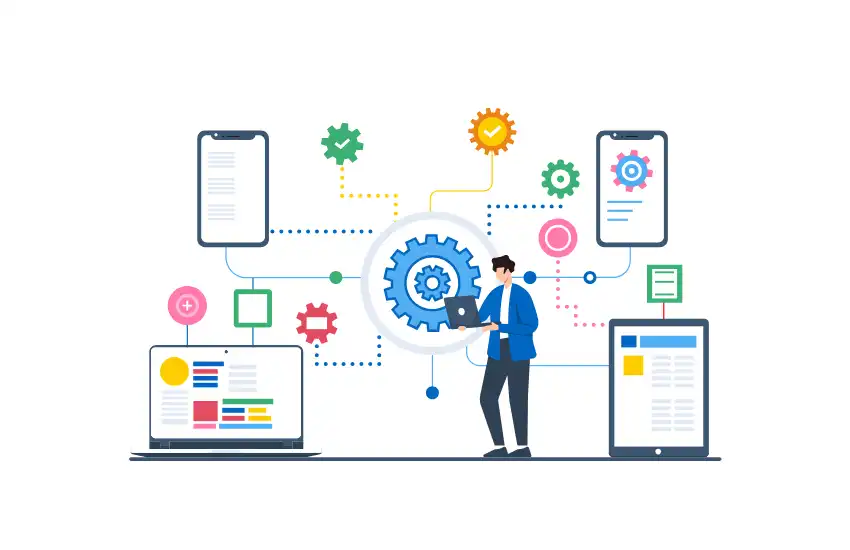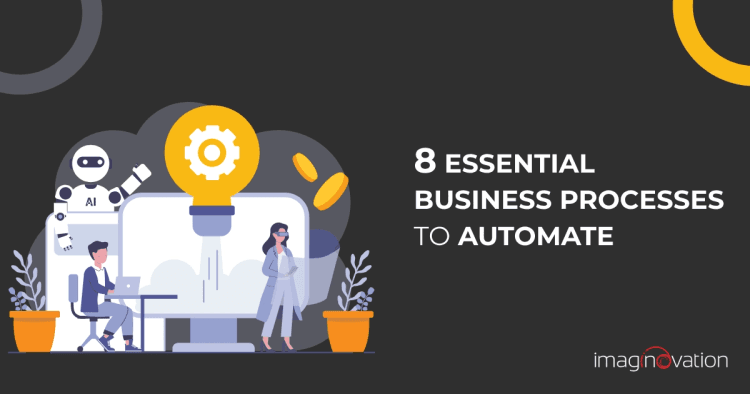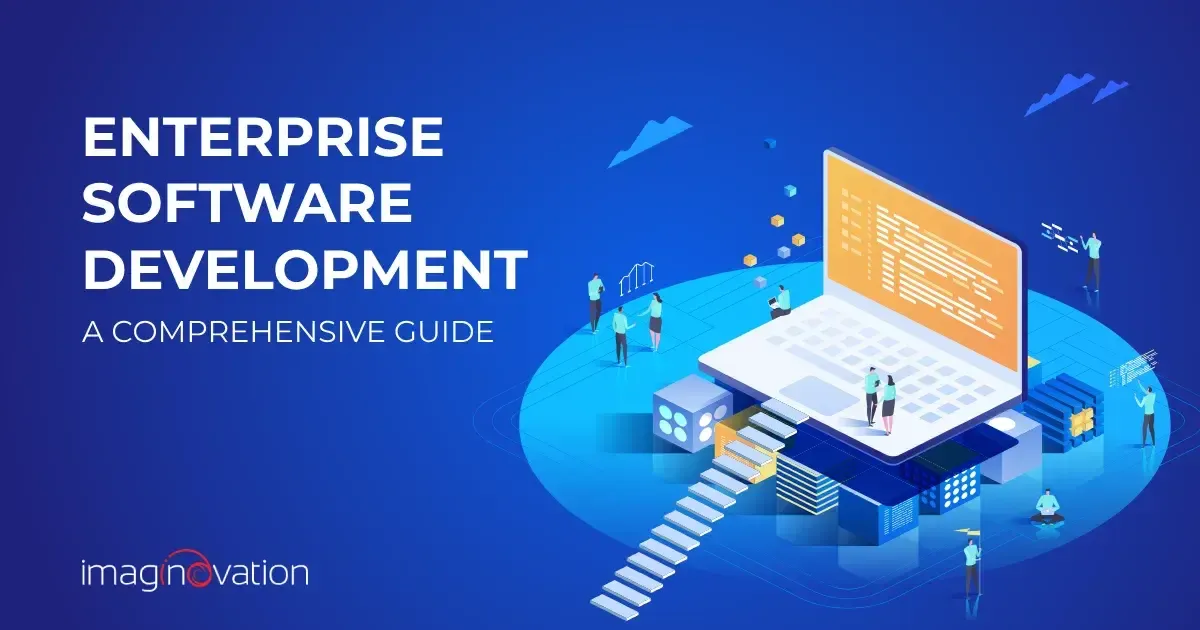To estimate the cost of building a website or an app, use our app cost calculator tool.
Automating business processes isn't some distant future idea—it's happening right now and changing how we work. By streamlining everyday tasks, automation helps businesses work faster, improve quality, and manage growing demands without burning out the team.
For companies aiming to stay competitive and get more done with less, automation is quickly becoming a must-have tool.
In fact, studies show that around 90% of workers say automation has boosted their productivity, and 80% report that it strengthens relationships with customers and stakeholders. So, exploring business process automation isn't just helpful—it's essential. C-level leaders who prioritize automation can drive greater success for their businesses.
In this article, we'll dive into the key processes every company should consider automating to maximize impact.
Let's get started!
8 Business Processes to Automate for Maximum Impact
Still on the fence about automating your business? Here’s a powerful stat: by 2024, an estimated 69% of daily management tasks will be automated, according to Gartner. So, if automation isn’t on your radar yet, it might be time to take a closer look.
The big question is—where should you start? Here are some key processes that, when automated, can free you up to focus on what truly matters. While there’s no one-size-fits-all approach, these focus areas can set your business up to thrive and achieve remarkable results!
Also Read: How to Get Started with Business Process Automation?
1. Invoice Processing
With manual invoice processing, you may find yourself buried in a mountain of invoices, and while that might be an exaggeration, the process can quickly become time-consuming.
- Challenges: Manual invoice processing often introduces errors due to data entry, increasing processing times and labor costs. Additionally, delays can lead to late payments, potentially straining relationships with vendors and suppliers.
- Automated Invoice Processing: Automated invoice processing streamlines your accounts payable workflow, enhancing efficiency in handling invoices. This automation can help foster strong vendor relationships, a key focus for procurement teams. Typical steps include extracting invoice data, entering it into the accounting system, and automatically reviewing and approving invoices based on pre-set criteria.
2. Customer Service
Here's the thing—in a booming business environment, a flood of customer inquiries can easily stretch your service team thin. When customers experience long wait times, they may be tempted to switch to a competitor that responds more swiftly.
What do you do at such times? That's where customer service automation solutions can make all the difference.
- Challenges: Managing high volumes of routine customer queries can quickly overwhelm your customer service team. Simple questions may pile up and sideline critical issues, leaving customers waiting longer for answers. Such scenarios could lead to a decline in service quality, increased burnout among your staff, and little time left for them to focus on strategic work.
- Customer Service Automation: Customer service automation is the solution to managing high volumes of customer inquiries with minimal or no interaction from your service reps. Depending on your business needs, automation options range from simple to complex, including automated ticketing systems, AI chatbots, IVR, automated notifications, and more. These solutions not only enhance the customer experience but also boost the productivity of your customer service team.
3. Sales Automation
A sales representative's role goes far beyond closing deals. The sales team must understand each prospect's unique needs, update CRM records, research potential clients, and more. Many of these tasks are time-consuming, so sales automation solutions are game-changers—streamlining processes and freeing up time to focus on what matters: building relationships and driving sales.
- Challenges: Typically, when you look at traditional sales automation, you will find that sales reps are involved in capturing and updating customer data, which includes dealing with information from emails, adding account records, and more. The customer also must deal with sending quotes for approvals, etc. Many of these tasks are time-consuming and impact the sales team’s productivity.
- Sales Automation Solutions: Sales automation solutions take on the heavy lifting, simplifying lead management and allowing the sales team to focus on high-impact tasks. Combined with AI, these solutions also streamline pipeline management and analyze sales calls, helping to create more accurate forecasts and more efficient sales processes.
4. Accounting Reconciliation
Financial reconciliation requires meticulous attention to detail to highlight, investigate, and resolve discrepancies. While some companies perform reconciliation monthly, others may do it more frequently.
However, this process, too, can be highly time-consuming, with staff spending hours reviewing receipts, statements, or cross-referencing spreadsheets. In these cases, account reconciliation automation solutions can be beneficial.
- Challenges: Accounting reconciliations often face significant challenges, including high transaction volumes, data quality issues such as inaccuracies or inconsistencies, and reliance on manual processes. Additionally, manual methods lack standardization, resulting in departments performing account reconciliations in varying ways.
- Accounts Reconciliation Automation Solutions: Automation solutions can effectively address these challenges, making account reconciliations faster and simpler. By harnessing advanced technologies like AI, machine learning (ML), and robotic process automation (RPA), these tools can handle repetitive tasks, identify exceptions that need extra attention, and analyze patterns for greater accuracy. This streamlined approach reduces manual effort and enhances the overall efficiency and consistency of the reconciliation process.
5. Human Resource Planning (HRP)
Human resources is another critical area where automation can save time and elevate personnel management.
With HR process automation solutions, HR teams can boost productivity, freeing them to focus on high-value tasks like strategic planning, employee engagement, and retention. This shift allows HR to play a more impactful role, building stronger teams and a better work environment.
- Challenges: Human resources teams often spend considerable time manually providing new hires with essential forms, documentation, and training resources while also working to identify skill gaps and develop programs that encourage continuous learning. Aligning employee goals with company objectives, pinpointing areas for improvement, and supporting career growth add further layers of complexity that require careful planning.
Recruitment, too, demands significant time, money, and effort to secure the right talent. These interconnected responsibilities make HR complex and resource-intensive, highlighting the need for more streamlined, efficient solutions.
- HRP Automation: Automating human resources tasks can streamline repetitive processes, allowing HR teams to focus on strategic work. Payroll processing, for instance, becomes accurate and timely without manual effort. Employee onboarding is simplified as forms, training materials, and policies are automatically sent to new hires. Automated timekeeping tracks hours, attendance, and leave seamlessly, reducing administrative overhead. With these tasks handled efficiently, HR can better support employee engagement, career development, and overall growth.
6. Electronic Health Records (EHR) Management
Electronic Health Records (EHR) revolve around patient data, which needs to be structured and standardized for optimal use. Automation can streamline this data, enhancing patient care, reducing errors, and boosting efficiency.
- Challenges: Let's start by exploring the challenges surrounding electronic health records (EHR). When records are entered manually, there's a higher risk of errors and inconsistencies, which can lead to costly mistakes. Manual data entry is also time-consuming for healthcare professionals, taking time away from direct patient care. As a result, patient information may often be outdated, incorrect, or inconsistent—posing severe challenges to accurate diagnosis and treatment. Addressing these issues is essential for improving efficiency and patient safety in healthcare.
- EHR Automation Solutions: Automating EHR systems ensures that patient data remains structured and standardized, making it easily accessible across departments. Automation addresses significant bottlenecks in data management by eliminating paper-based processes and reducing inconsistencies. With intelligent automation (IA), patient information remains secure and accurate. By streamlining these manual tasks, clinicians can focus more on patient care and meeting patient needs, ultimately enhancing healthcare quality.
7. Expense Management
Manual expense reporting can seriously hinder productivity, often leading to a buildup of paperwork and end-of-day bottlenecks. Automation solutions can simplify and speed up these tasks, helping finance teams to operate more efficiently and scale their capacity and capabilities. By streamlining expense reporting, automation frees up valuable time and reduces administrative headaches, allowing teams to focus on higher-value work.
- Challenges: Expense management is often bogged down by manual data entry, which is error-prone and frustrating for employees. Duplicate submissions, lost receipts, and delayed reimbursements add to the complexity, impacting productivity. For finance teams, expense reports piling up at deadlines create processing bottlenecks, while manual reviews risk compliance issues and missed policy violations. These challenges indicate the need for a streamlined, efficient solution that reduces errors and saves time for everyone involved.
- Expense Management Automation: When it comes to expense management automation, you will find the usage of software that supports automation and optimizing processes related to business expenses. The solutions can leverage technology, including AI, ML, and analytics, to simplify expense-related tasks to help with data extraction, policy enforcement, reporting, and analytics.
8. Social Media and Digital Marketing
Every business aims to connect with potential customers and strengthen its brand presence. Social media marketing is a powerful way to achieve this but can be time-intensive. That's where social media marketing automation solutions prove invaluable.
- Challenges: Social media and digital marketing come with challenges, such as encouraging potential customers to engage with your content, reaching the right audience, standing out from competitors, and capturing attention in a crowded space. Measuring ROI and generating quality leads can also be challenging. In today's fast-paced business environment, these evolving challenges can be overwhelming, but automation solutions offer powerful support in tackling these diverse needs effectively.
- Social Media and Digital Marketing Automation Solutions: Social media and digital marketing rely on tools and software to keep your online presence active and engaging. These solutions streamline repetitive tasks like scheduling posts, interacting with followers, responding to comments, and analyzing performance metrics. Automating these activities can save time and increase efficiency, freeing up more resources to focus on strategic, high-impact tasks.
Also Read: Enhancing Business Processes with Gamification
Benefits of Automating These Core Processes

The benefits of automating business processes are remarkable, offering numerous compelling reasons to embrace them. Here are some key benefits.
1. Improved Productivity
Automating complex manual business processes allows multiple tasks to happen at once. For example, digital tools can simultaneously handle record requests and retrieval, completing tasks faster and with fewer errors.
2. Increased Security
Physical documents are usually vulnerable to theft or damage. Automation can now add layers of security to protect data, using secure digital storage and controlled access.
3. Streamlined Compliance
Automation keeps a record of all process details, making compliance easier and readily accessible for audits.
4. Better Operational Efficiency
Business process automation ensures seamless task progression. Plus, it corrects bottlenecks and improves overall performance without constant monitoring.
5. Augmented Collaboration
Automation simplifies tasks and enhances communication. It can send reminders and updates and help your team collaborate more smoothly.
6. Leveraged Service Delivery
With repetitive tasks automated, your team can now focus on delivering high-quality services. It can further improve customer experience and help meet the service goals.
7. Improved Cost Savings
Automation can minimize waste and optimize resources. It helps reduce operational costs and enhances profit margins.
8. Lesser Errors
Automated workflows minimize human error, streamlining record-keeping and avoiding costly mistakes.
9. Standardized Processes
Automation ensures consistency across workflows, reducing discrepancies and creating smoother operations.
10. Improved Transparency
Custom dashboards provide visibility into performance, keeping your team informed and accountable.
Partner with Imaginovation for Automation Excellence
Automating business processes can indeed be a game-changer. With the right partner, you can unlock phenomenal growth, and at Imaginovation, we offer the expertise you need for process assessment and automation strategy.
As an award-winning software company in the US, we specialize in creating tailored automation solutions to meet your organizational needs. Our team is skilled in selecting and integrating the right automation technologies, and we can support you so you can confidently focus on your business.
Connect with our team today for a comprehensive automation consultation. Let's get started!











